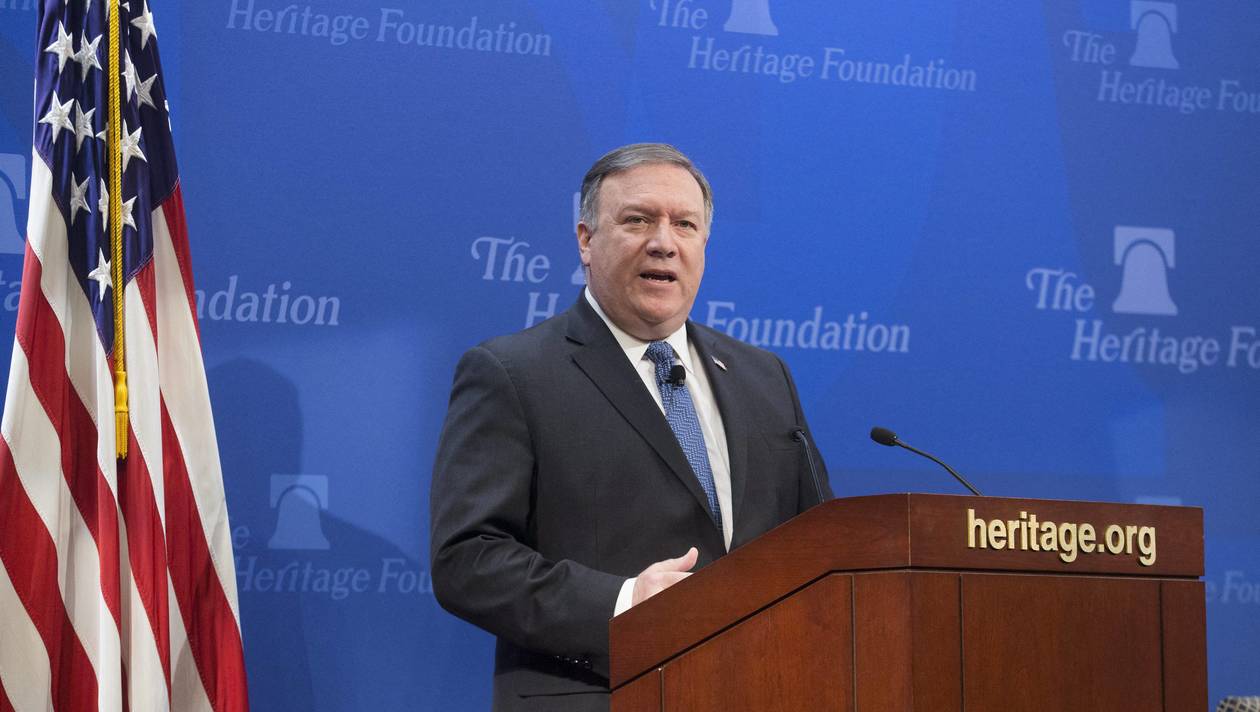Senior Iranian officials have denounced the latest remarks made by U.S. Secretary of State Mike Pompeo, whereby he threatened to impose the “strongest sanctions in history” on Iran.
“US diplomacy sham is merely a regression to old habits: imprisoned by delusions & failed policies – dictated by corrupt Special Interest – it repeats the same wrong choices and will thus reap the same ill rewards. Iran, meanwhile, is working with partners for post-US JCPOA solutions,” Iran’s Foreign Minister Mohammad Javad Zarif wrote on his Twitter account on May 21 following Pompeo’s remarks made at The Heritage Foundation in Washington.
Pompeo defended President Trump’s May 8 announcement that the U.S. is withdrawing from the Joint Comprehensive Plan of Action (JCPOA) that was negotiated in 2015, saying Iran must report to the International Atomic Energy Agency about its nuclear program, end the proliferation of its missiles, and stop supporting "terrorist groups" in the Middle East.
Pompeo spelled out 12 conditions for Iran in order for the U.S. to agree to a new deal with Tehran. Speaking about the sanctions the U.S. intends to re-impose on Iran following the JCPOA, or ‘nuclear deal’ pullout, Pompeo said, “these will be the strongest sanctions in history by the time we are done.”
“This sting of sanctions will be painful if the regime does not change its course from the unacceptable and unproductive path it has chosen to one that rejoins the league of nations.”
Iranian President Hassan Rouhani said in a subsequent meeting with a group of professors and doctors in Tehran that “it is in no way acceptable that a man who had been working in a spy center for years tell Iran and other countries what to do as Sectary of State of the United States. Who are you to decide for Iran and the world, telling Iran what to do and what not to do in its nuclear technology?”
Rouhani was referring to Pompeo’s previous job as Director of the U.S. Central Intelligence Agency, a post he held from January 23, 2017 – April 26, 2018.
“These words are like the same words that Americans have said before and the Iranian nation have been, and are, indifferent to them and will continue along their path together, Rouhani said, according to a transcript provided by his office.
Meanwhile, the European Union criticized Pompeo’s speech, as is trying to persuade Iran to stay in the 2015 agreement without Washington's participation. EU foreign policy chief Federica Mogherini said on Monday that there is "no alternative" to the nuclear deal, adding that Pompeo's speech did not demonstrate "how walking away from the JCPOA has made or will make the region safer from threat of nuclear proliferation."
The U.S. Treasury has put European businesses on notice that they have 90 days to wrap up most of their dealings with Iran before the renewed U.S. sanctions take effect.
Earlier, the U.S. has fined European and Asian banks and businesses billions of dollars for violating its sanctions. To avoid such consequences, the European Union is planning to activate a mechanism that could lessen the impact of U.S. sanctions on European firms doing business in Iran. The blocking regulation, which was originally crafted in 1996 in response to U.S. sanctions against Cuba, makes it illegal for EU companies to comply with laws with extraterritorial application.
Iran hopes the European Union will pass laws to protect European firms from any potential U.S. sanctions, which could prohibit them from executing multi-billion dollar deals that Iran has negotiated with European firms. On May 18, the European Commission proposed to let EU members make payments for oil directly to the Iranian central bank to bypass U.S. sanctions.
The JCPOA allowed Iran’s economy to re-engage with world trade, especially to develop closer banking cooperation with European countries, so long as Iran curbed its nuclear program. Iranian officials have said they will remain committed to the JCPOA if France, Germany and the U.K. cooperate with Tehran and stand firmly behind the deal.







 President Ilham Aliyev shed light on the evolving contours of the peace process with Armenia during an international conference in Baku this week. ...
President Ilham Aliyev shed light on the evolving contours of the peace process with Armenia during an international conference in Baku this week. ...
 Azerbaijan and Armenia started the process of demarcation of their border on Tuesday, with the installation of the first border markers based on ge...
Azerbaijan and Armenia started the process of demarcation of their border on Tuesday, with the installation of the first border markers based on ge...
 President Aliyev emphasized the critical role of the North-South Transport Corridor in fostering transport cooperation between Azerbaijan and Russi...
President Aliyev emphasized the critical role of the North-South Transport Corridor in fostering transport cooperation between Azerbaijan and Russi...
 Russian Foreign Minister Sergei Lavrov has reasserted that Moscow has no intentions to stop the fighting in Ukraine, even if peace talks commence.
Russian Foreign Minister Sergei Lavrov has reasserted that Moscow has no intentions to stop the fighting in Ukraine, even if peace talks commence.
 Iran and Pakistan have signed eight cooperation documents in various fields, and agreed to strengthen ties to fight terrorism in the region.
Iran and Pakistan have signed eight cooperation documents in various fields, and agreed to strengthen ties to fight terrorism in the region.



